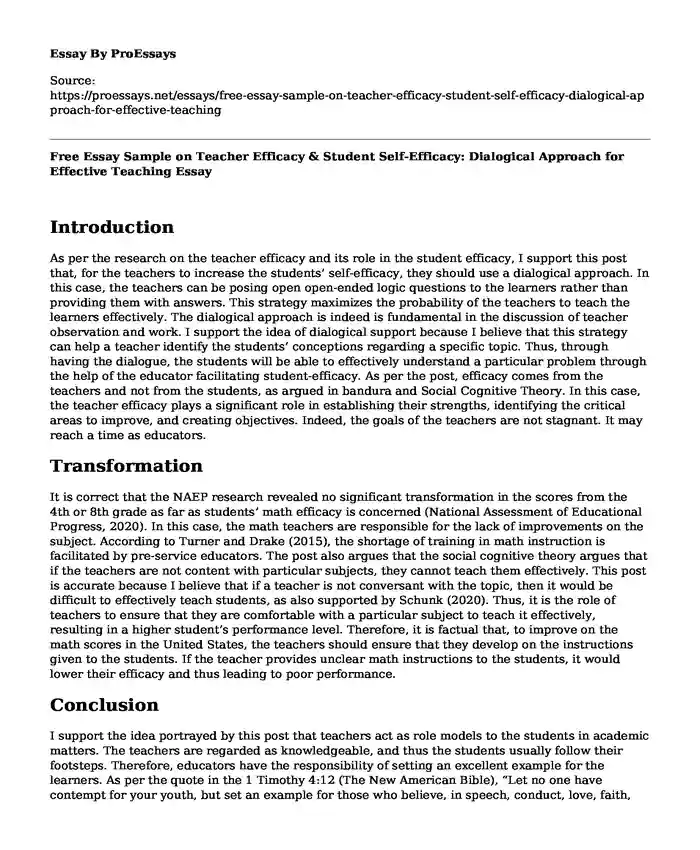Introduction
As per the research on the teacher efficacy and its role in the student efficacy, I support this post that, for the teachers to increase the students’ self-efficacy, they should use a dialogical approach. In this case, the teachers can be posing open open-ended logic questions to the learners rather than providing them with answers. This strategy maximizes the probability of the teachers to teach the learners effectively. The dialogical approach is indeed is fundamental in the discussion of teacher observation and work. I support the idea of dialogical support because I believe that this strategy can help a teacher identify the students’ conceptions regarding a specific topic. Thus, through having the dialogue, the students will be able to effectively understand a particular problem through the help of the educator facilitating student-efficacy. As per the post, efficacy comes from the teachers and not from the students, as argued in bandura and Social Cognitive Theory. In this case, the teacher efficacy plays a significant role in establishing their strengths, identifying the critical areas to improve, and creating objectives. Indeed, the goals of the teachers are not stagnant. It may reach a time as educators.
Transformation
It is correct that the NAEP research revealed no significant transformation in the scores from the 4th or 8th grade as far as students’ math efficacy is concerned (National Assessment of Educational Progress, 2020). In this case, the math teachers are responsible for the lack of improvements on the subject. According to Turner and Drake (2015), the shortage of training in math instruction is facilitated by pre-service educators. The post also argues that the social cognitive theory argues that if the teachers are not content with particular subjects, they cannot teach them effectively. This post is accurate because I believe that if a teacher is not conversant with the topic, then it would be difficult to effectively teach students, as also supported by Schunk (2020). Thus, it is the role of teachers to ensure that they are comfortable with a particular subject to teach it effectively, resulting in a higher student’s performance level. Therefore, it is factual that, to improve on the math scores in the United States, the teachers should ensure that they develop on the instructions given to the students. If the teacher provides unclear math instructions to the students, it would lower their efficacy and thus leading to poor performance.
Conclusion
I support the idea portrayed by this post that teachers act as role models to the students in academic matters. The teachers are regarded as knowledgeable, and thus the students usually follow their footsteps. Therefore, educators have the responsibility of setting an excellent example for the learners. As per the quote in the 1 Timothy 4:12 (The New American Bible), “Let no one have contempt for your youth, but set an example for those who believe, in speech, conduct, love, faith, and purity,” Timothy was urged to be strong in his faith and act as a role model to other youths. This quote shows how the developed people in the real world in the holy spiritual matters should set examples for developing individuals. Connecting this quote to the student efficacy, I support the post’s idea that the teachers should act as role models for them. However, educators cannot serve as a valid example if they are not trusting in themselves. Thus, it is true that if the teachers lack the courage in themselves, then it would be hard for them to set a good role model for students. If the teacher is confident, then there is a higher probability that the students will develop their self-efficacy.
References
National Center for Educational Statistics. (2020) The Nations Report Card. National Assessment of Educational Progress (NAEP).
https://www.nationsreportcard.gov/highlights/mathematics/2019/.
The New American Bible. (2002) The New American Bible. The Vatican.
http://www.vatican.va/archive/ENG0839/_INDEX.HTM
Schunk, D. H. (2020). Learning theories: An educational perspective – With access (8th ed.). Upper Saddle River, NJ: Pearson. ISBN:9780134893754.
Turner, E. E., & Drake, C. (2015). A Review of Research on Prospective Teachers’ Learning About Children’s Mathematical Thinking and Cultural Funds of Knowledge. Journal of Teacher Education, 67(1), 32-46.
https://doi.org/10.1177/0022487115597476Bottom of Form
Cite this page
Free Essay Sample on Teacher Efficacy & Student Self-Efficacy: Dialogical Approach for Effective Teaching. (2023, Oct 12). Retrieved from https://proessays.net/essays/free-essay-sample-on-teacher-efficacy-student-self-efficacy-dialogical-approach-for-effective-teaching
If you are the original author of this essay and no longer wish to have it published on the ProEssays website, please click below to request its removal:
- The Pain and the Rise to Success After Losing my Job Essay
- Evaluating Truth and Validity Exercises Paper Example
- Essay Sample on Teaching Philosophies
- Communication and Professional Relationships With Children and Young People Essay
- Essay on Malay Language Teaching in Chinese Universities: Strengthening Chinese Influence
- Essay on Cognitive Apprenticeship: Gaining Skills Through Guidance and Experience
- White Plains Dual Language Program: K-12 Education for Bilingualism, Biliteracy, Biculturalism - Research Paper







